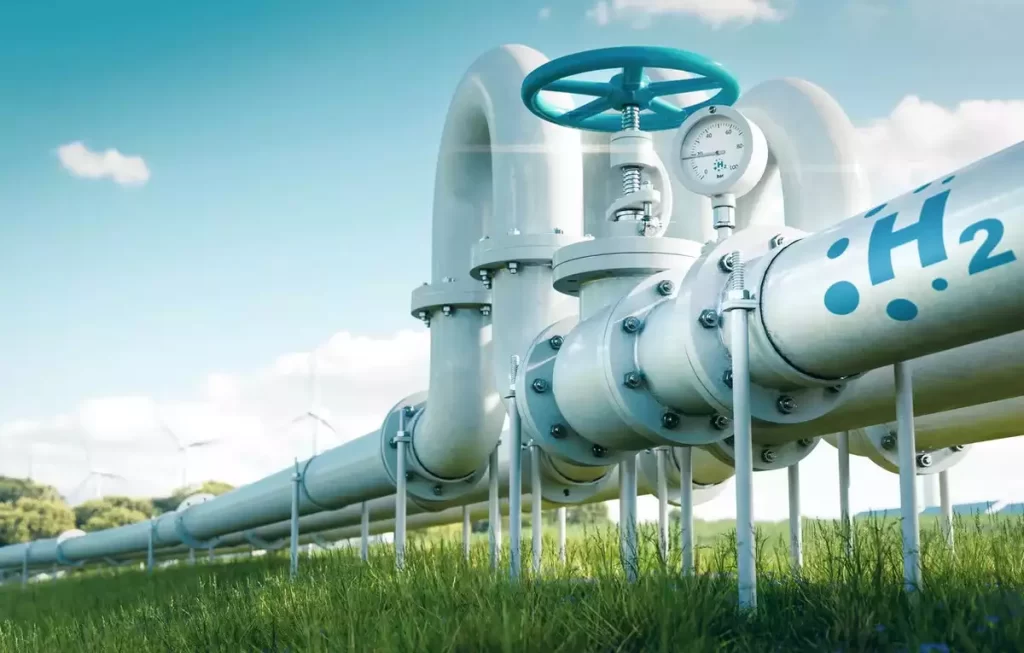Hydrogen is a highly combustible, clean fuel that emits only water when burned, making it an environmentally friendly option. Hydrogen might be green, blue, brown, yellow, turquoise, or even pink, depending on how it is produced. These colours are merely colour codes used in the energy industry to distinguish between different types of hydrogen depending on the generation method. No global naming protocol exists; colour designations can alter over time and even within countries.
The colour codes have nothing to do with the properties of hydrogen. The substance is colourless, odourless, and tasteless, with no discernible distinction between the various forms of hydrogen.
Green hydrogen energy is produced entirely from renewable wind and solar energy, making it the cleanest and most sustainable hydrogen available. It minimizes the need for fossil fuels, making it a significant solution to climate change. Green hydrogen can also be produced domestically, reducing reliance on imported energy sources.
Last year, May 17 – 18, the world witnessed the first-ever Green Hydrogen Global Assembly held in Barcelona. This summit gathered together global leaders and stakeholders to blueprint the role of green hydrogen in addressing the simultaneous concerns of climate change and energy security. Some of the noteworthy highlights of the event were the launching of the Green Hydrogen Standard and the Africa Green Hydrogen Alliance (AGHA)
Green Hydrogen Standards
GHS was established to support the reduction of global emissions, promote investment, and develop a new energy system. It is defined as hydrogen produced by electrolysis of water using 100% or nearly 100% renewable energy with close to zero greenhouse gas emissions.
It mandates that the impacts and development opportunities associated with the production of green hydrogen be taken into account, along with the environmental, social, and governance implications of doing so. In addition, the licence to use the label “GH2 Green Hydrogen” and the ability to obtain and exchange GH2 certificates of origin for green hydrogen and its derivatives, like green ammonia, will be granted to green hydrogen projects all over the globe that comply with the Standard by the Organization.
Africa
The AGHA was founded to position the continent as a global leader in producing clean energy to strengthen collaboration and accelerate the development of its projects on the African continent. The Alliance brings together 6 African countries: Egypt, Kenya, Mauritania, Morocco, Namibia, and South Africa. It strengthens collaboration and accelerates the development of projects on the African continent. The Alliance focuses on public and regulatory policy, capacity building, funding, and certification requirements.
South Africa just concluded its 2nd Green Hydrogen Summit on the 16-17 October. This is just one of several green hydrogen summits and initiatives held in the country this year as part of the country’s goal of becoming the continent’s leading fuel producer. With its ambitious goal of developing various initiatives valued at around $17.8 billion by 2030, the country also intends to establish an export hub for green hydrogen as part of its energy transition strategy.
It should be noted that South Africa’s Minister in the Presidency for Electricity, Dr Kgosientsho Ramokgopa, was recently appointed chairperson of the Alliance (AGHA) on the fringes of the first Africa Climate Summit, which took place from September 04-06, 2023.
Another continent-based advocate is the African Hydrogen Partnership, an African umbrella non-profit association committed to developing green and natural hydrogen generated in Africa. AHP contends that the world cannot decarbonize without green hydrogen from Africa and that if African countries can produce at a competitive cost, they will become significant energy producers, revolutionizing their economies.
Given the growing concerns about the global warming catastrophe, Africa’s investment in green hydrogen and related technologies would improve climate protection and ensure sustainability because it is an ecologically sound energy source.
Fuel production has the potential to foster energy security through the expansion of electrical infrastructure, which will help address the electricity shortage, particularly in Sub-Saharan Africa, where access to electricity is the lowest globally for various reasons.
Because it is easily stored and transported, it is a versatile energy option for rural areas or regions with limited access to typical energy sources. Furthermore, it is an alternative fuel to gas and coal, reducing Africa’s reliance on fossil fuels. Developing its infrastructure can also create job opportunities and stimulate economic growth in these regions.
Regional and continental collaboration is critical for successfully building Africa’s robust industry. By collaborating, African countries can exchange resources and expertise and interlink the growing hydrogen ecosystems, accelerating the adoption of renewable energy solutions across Africa, facilitating the reindustrialization of the energy industry as a whole and developing a robust economy for the continent.
Tanzania
A dynamic potential for renewable energy sources distinguishes Tanzania’s energy landscape. The country has abundant natural resources like solar, wind, geothermal, and natural gas. Tanzania has great potential in producing low-cost hydrogen, propelling the country’s energy and agricultural industries.
Its generation will assist citizens by lowering energy costs and helping to reduce unemployment, to name a few benefits. Investing in green hydrogen energy will help her achieve her goal of ensuring widespread access to electricity throughout Tanzania.
The AGHA will undoubtedly help Tanzania, as the coalition will provide her with the resources and expertise required to develop green energy production. It will also offer her an edge in the regional and worldwide markets.
Tanzania could benefit from AHP’s interest in prospective hydrogen-related industries in East Africa. The AHP aspires to develop a hydrogen corridor in East Africa to achieve the world’s first large-scale commercialization of clean, sustainable, and renewable green hydrogen.
This initiative could bring significant economic growth and job opportunities to Tanzania, attracting investments and promoting the development of hydrogen-related infrastructure. Additionally, by participating in the green hydrogen corridor, Tanzania can contribute to global efforts in reducing carbon emissions and transitioning towards a more sustainable energy future.
You can find and read more of Insightful Climate analyses here.

